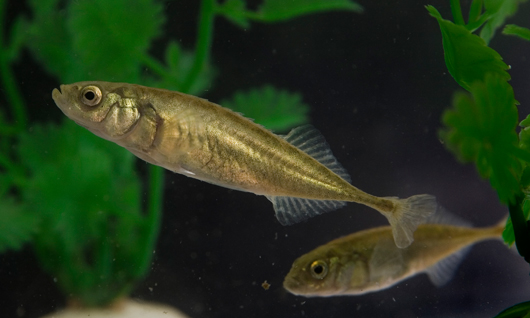Your plaice or mine?

Male fish are so stubborn that they refuse to ask for directions, especially when they are ready to reproduce.
According to the latest research, when male fish are in a reproductive state, they turn into anti-social feeders that take bigger risks by leaving the shoal behind.
The new study, by scientists at the University of St Andrews, is one of the first to reveal a sex difference in how animals learn from each other.
The fact that it is only seen in male fish when they are breeding may be related to the different pressures faced by the sexes when reproducing.
Dr Mike Webster and Professor Kevin Laland set out to examine the learning and copying behaviour of the ninespine stickleback… with surprising results.
Like many other animals, fish are capable of learning valuable information about their surroundings from each other. The ninespine stickleback in particular is a fish known to be capable of sophisticated social learning behaviour, gathering and using information from others about the location and quality of food resources.
Yet during the recent study, the St Andrews team found the male of the species spurns such information when in the mood for love. Rather than use their usual reliance on information available from others, they did the exact opposite – leaving the safety of the shoal to hunt alone for food reserves. Surprisingly, taking the risk was more likely to yield positive results.
The researchers say that the research will allow better understanding of the conditions that gave rise to the evolution of the sophisticated learning seen in other animals and humans.
Dr Webster explained, “Over the last few years we have learned the surprising extent of the cognitive capabilities of many species of fish, and recent research has shown that rather than blindly copying others, fish are selective in when they copy and even who they learn from.
“Reproductive males seem to behave in a way which courts risk; they are more active, spend more time in the open and spend less time shoaling with others. However this may be adaptive if it allows them to forage more efficiently.”
The behaviour of the male fish was a complete contrast to egg-laden females, who instead increased their reliance upon information from others. They spent more time in the areas where they had seen others feeding at a high rate and they were less likely to switch between feeding grounds to investigate them for themselves.
The researchers suggest that the extra weight of eggs is likely to slow females down as well as make them more obvious to predators. By copying others and sticking to the shoal, they save energy and lessen the likelihood of encountering a predator.
The males on the other hand need to source food reserves so that they can spend as much time guarding and raising their young as possible.
Professor Laland commented, “While copying others is less risky, it can also be less accurate, compared to collecting firsthand information. The hormonal changes that cause a male to enter his reproductive phase may also be responsible for this transition to more antisocial behaviour.”
“This work will allow us to better understand conditions that gave rise to the evolution of the sophisticated learning seen in animals and humans.”
Dr Webster added, “We are all familiar with the stereotype of males refusing to ask for directions – this might apply to fish too, but only when they are preparing to breed.”
The research is published by Proceedings of the Royal Society Series B- Biological Sciences
ENDS
Note to Editors
The researchers are available for interview:
Dr Mike Webster, Tel: 07779 099569, email [email protected]
Professor Kevin Laland, Tel: 01334 463568, email [email protected]
Note to Picture Editors
Images of ninespined stickleback are available from the Press Office – contacts below.
Issued by the Press Office, University of St Andrews
Contact Gayle Cook, Senior Communications Manager on 01334 467227 / 462529, mobile 07900 050 103, or email [email protected]
Ref: Your plaice or mine 080910
View the latest University press releases at www.st-andrews.ac.uk
Category Research